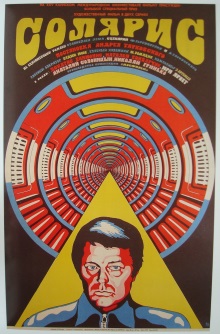
This is one of those occasions on which I’ve first watched the remake, in this case Steven Soderbergh’s 2002 version, before watching this earlier version by Andrei Tarkovsky. This was way before I started watching films seriously and I remember being perplexed by it but I thought it still did a fairly good job of depicting the alienness of the planet Solaris. Tarkovsky’s version turned out to be much more personal and individual, focusing with laser-like intensity on the inner psychology of its protagonist Kris Kelvin.
Ironically he is himself a psychologist, sent to assess the remaining three inhabitants aboard the space station that was built to study this mysterious planet. Despite decades of research, little is known about the planet. The scientists believe that the strange oceans of Solaris are some form of intelligent being but are unable to communicate with it. When Kelvin arrives, he discovers that one of the scientists has just committed suicide. Moreover he learns that the station is inhabited by more than just the scientists. Beings who resemble the people drawn from the pasts of the humans have been created by unknown means. Though they resemble humans they prove to be immortal. In Kelvin’s case, it is his late wife Hari who returns to him and he must grapple with the question of how real she is.
As usual with Tarkovsky, the images are sublime, with the shots of the lake at the beginning of the film being especially reminiscent of Stalker. The use of video testimony works wonderfully to ramp up the tension of the mysterious powers attributed to the planet without any need for expensive special effects. In other ways though the lack of budget feels more acute. The dilapidated state of the station is a unique look for a science-fiction film but I preferred the clean slickness of the Hollywood-made Solaris to better capture the sense of alienation experienced by the scientists. Similarly the extended footage of a car travelling on a freeway in Tokyo is a clever idea of representing a long space journey if you don’t have the money to make and film spaceships, but it drags on for far too long.
Solaris also suffers from the fact that its themes have long since been a staple of science-fiction on television and its execution doesn’t stand out enough to make it clearly superior to all other versions. I found the ending to be predictable and similar in feeling to episodes of The Twilight Zone. I’m particularly disappointed that the film doesn’t explore the beings created from the memories of the other scientists at all. This seems like a missed opportunity to show how people with different personalities respond differently to these beings. As it stands, while this version may be better in terms of mood and cinematography, I think that Soderbergh’s version may actually be the better overall film.
I will say in Tarkovsky’s favor that after watching this I decided that I was too harsh on Stalker. Even months after watching it, its images remain vivid in my mind and I’m struck all over again by how its visuals complement its visuals to me. By contrast, as interesting as Solaris is, I find it hard to believe that any of visuals will be particularly memorable to me.